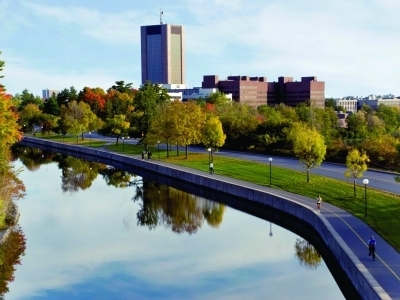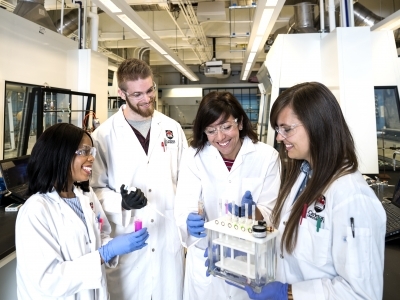In issues surrounding mental health awareness and an aging population, neuroscience is a field that is booming in the workforce – and at Carleton University.
“Neuroscience is an area of growing public interest,” says John Stead, chair of Carleton’s Department of Neuroscience. “And we’re a new department, so we have an energy to us.”
Founded in 2010, the department offers master’s and PhD programs and runs new and highly successful BSc programs in Neurosience and Mental Health.
Around 40 current graduate students are conducting cutting-edge research in various areas including neurodegeneration, stem cell research, mood disorders, concussion and chronic pain.
“We are the first university in the country to have a department in neuroscience that offers its own undergraduate programs,” says Stead. “There are a huge number of new courses and, by this Christmas, we will have taught 12 brand new courses in two and a half years.”
With a faculty of less than 10, Stead says the program’s professors are a successful group of grant and award-winning academics, many of whom have won funding from the Natural Sciences and Engineering Research Council of Canada (NSERC) and the Canadian Institutes of Health Research (CIHR).
“(The faculty) makes an effort to engage with students and they are willing to go the extra mile for students,” says Stead.
The department is also involved in community outreach, he says, adding that students and faculty celebrate Brain Awareness Week annually by giving talks in local schools about neuroscience. The department is also involved in public lectures, and holds an annual art show where students sell art work and give proceeds to charity.
Stead says that while the department has been successful partly because of community outreach, there are many other reasons why more students are becoming interested in studying neuroscience.
“Everyone knows someone who has mental health issues, and there’s a growing interest in how the brain works and when the brain doesn’t work the way it should,” Stead says.
Mental health has been a booming area in terms of research funding and progress, including U.S. President Barack Obama’s recent announcement of $300 million over 10 years for the Brain Initiative which would map the activity of every neuron in the human brain.
In addition to mental health, Stead says neuroscience has become more relevant than ever before because of an aging population – many of whom face dementia and other mental health problems.
When students graduate with a degree in neuroscience, Stead says many doors open for careers in research, health sciences, genetic counselling, pharmaceuticals and forensic sciences.
“Health is big, and it’s very reasonable to expect a lot of growing industry in the next few years.’’



